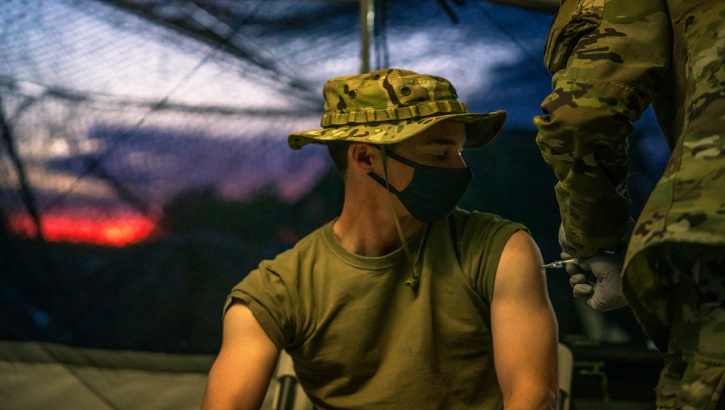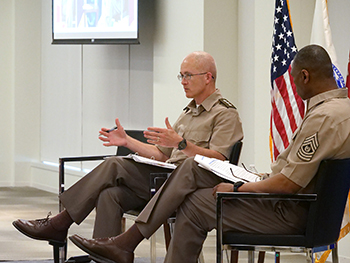COVID-19 Vaccines: Benefits Still Outweigh the Risks
 Soldiers from the 1st Battalion, 214th Aviation Regiment, were vaccinated on May 7, 2021, while in Bulgaria during exercise Swift Response ( Photo by: Army Maj. Robert Fellingham, 12th Combat Aviation Brigade).
Soldiers from the 1st Battalion, 214th Aviation Regiment, were vaccinated on May 7, 2021, while in Bulgaria during exercise Swift Response ( Photo by: Army Maj. Robert Fellingham, 12th Combat Aviation Brigade).
Only a small fraction of people in the military community have experienced breakthrough infections after receiving a COVID-19 vaccination - and none of them have died, according to Defense Health Agency Director Army Lt. Gen. (Dr.) Ronald Place.
Place revealed new data about breakthrough infections among people who are fully vaccinated against COVID-19 at a July 20 virtual town hall for DHA employees.
Place explained that the evidence shows how effective the vaccine has been and he encouraged all service members and others to get fully vaccinated.
"The fact of the matter is the efficacy is very good," Place said. "From a safety perspective, for those of us who are [fully] vaccinated, it is exceptionally uncommon for us to need hospitalization."
More than 2 million people in the Military Health System have received full COVID-19 vaccinations, Place said. Of that number, about 1,600 people have been infected with the novel coronavirus.
"How many of those have had to be hospitalized? Less than 50," he told nearly 2,000 employee town hall participants. "There have been no deaths among that hospitalized group."
Yet despite strong evidence of the vaccine's safety and efficacy, significant portions of the military and civilian populations remain hesitant to get the shot.
For those who remain skeptical, Place encouraged them to: "Have a true, meaningful conversation with somebody you trust or some buddies that you trust."
He suggested also talking to "your health care team, those family members that you trust and other members of the DHA that you may trust."
Place also shared his thoughts on the potential impact the unvaccinated population can have on their broader community.
 DHA Director Army Lt. Gen. (Dr.) Ron Place discusses the importance of full vaccination with DHA's Senior Enlisted Leader Command Sgt. Maj. Michael Gragg during an employee town hall at DHA headquarters in Falls Church, Virginia, July 20 (Photo by: Jaime Chirinos).
DHA Director Army Lt. Gen. (Dr.) Ron Place discusses the importance of full vaccination with DHA's Senior Enlisted Leader Command Sgt. Maj. Michael Gragg during an employee town hall at DHA headquarters in Falls Church, Virginia, July 20 (Photo by: Jaime Chirinos).
"I'm just concerned that there are a number of us who, for whatever reason, believe the best course of action is to not be vaccinated."
"I get it for the 19 year olds or the 16 year olds, the 24 year olds - 'I'm Superman. No bugs are going to beat me,'" he said.
"The answer to me then is the butterfly effect. How can we break that cycle" whereby an unvaccinated military service member may be asymptomatic, or minimally symptomatic, but spreads COVID-19 to family members and barracks mates, who then may spread the virus to others, sometimes with deadly consequences.
Echoing the motto of the San Antonio Market, Place said "it's not too late to vaccinate," because the pandemic is still with us.
He noted the uptick in COVID-19 cases across the country in recent weeks, largely driven by the Delta variant that spreads more easily than the variants which spread last year.
"No matter what metric you look at, it's worse. We thought we were in a good place based on [vaccination rates against] the variants that were in society at the time."
However, "this [Delta] variant is different. That means the vaccination level needs to go up," he said.
Discussing herd immunity, Place said: "It's not about 70%" of the armed services being [partially] vaccinated. He indicated that with our still somewhat limited understanding of this coronavirus, "to me the only number I can really be comfortable with is 100% [fully vaccinated]."
As of July 16, the Pentagon reported that 70% of military personnel have received at least one dose of one of the three COVID-19 vaccines, and 62% of service members are fully vaccinated.
In a same-day video, Department of Defense Secretary Lloyd J. Austin III stated that the military is being vaccinated with doses of the three vaccines "as fast as we can receive them."
"All the available vaccines have been authorized by the Food and Drug Administration for a simple reason: They are safe, and they are effective," Austin said in the video. "I got my shots, and I hope you will, too."
Learn more about vaccine efficacy against the Delta variant.